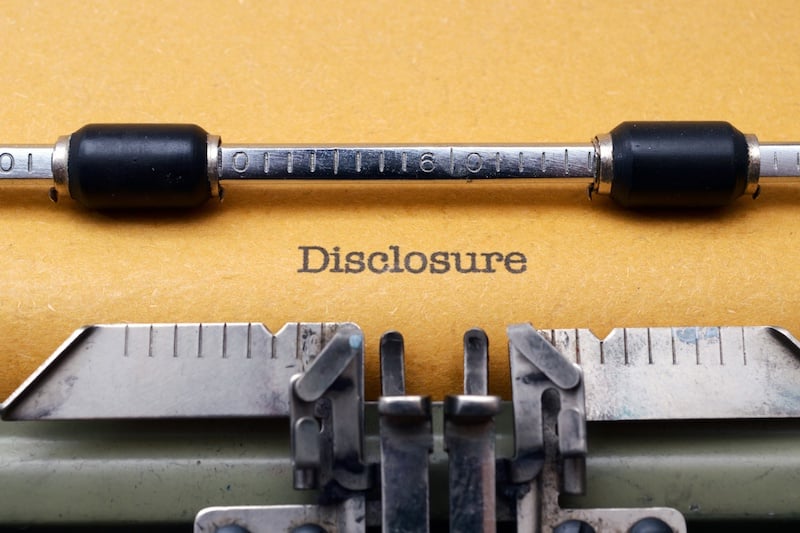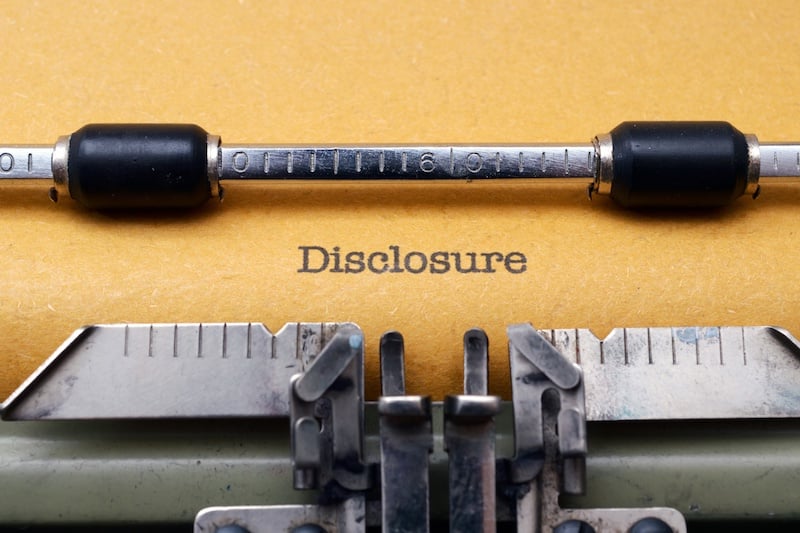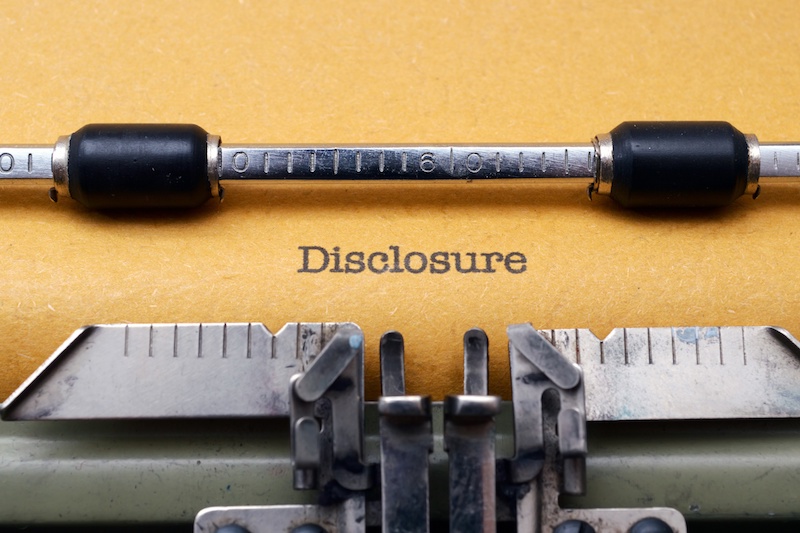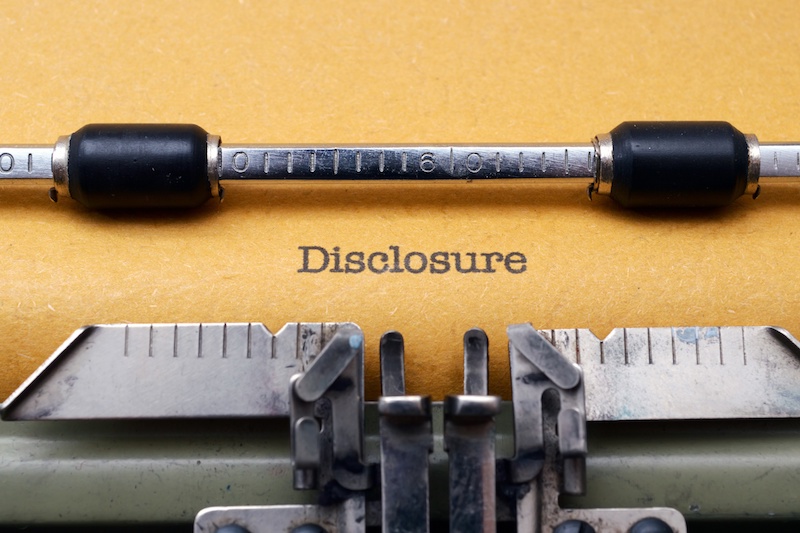
19 Things You’ll Need to Note on a Maryland Home Disclosure Form
Posted on Jan 14, 2022
Maryland home sellers are required to disclose the condition of their home. This means that they...

Posted on Jan 14, 2022
Is Delaware a disclosure state? Yes; in Delaware, home sellers are required by law to disclose the condition of their home.
If you’re preparing to sell your home, you may be wondering what your legal obligations are when it comes to disclosure.
Do you have to let them know your home flooded five years ago during a storm - even if you repaired all the damages? Do you need to let them know about the leaky roof?
It’s important to take the seller’s disclosure statement seriously - because failure to do so can expose you to liability down the road. Here’s what you need to know about these Delaware real estate forms.
These are the exact topics that the State Real Estate Commission includes in the seller's disclosure document. For further information on each point, jump down to the last section.
One of the most common questions listing agents field about the disclosure is, “Do I have to list X?” Whether X is water damage, contract work, etc.
Rather than thinking of the disclosure document as a test you can fail by listing your home’s faults, think of it as liability insurance that’s only valid if you list every defect you know.
Home buyers expect to encounter issues on the disclosure, because it’s rare for any lived-in home not to have a few issues. Disclosure protects you against future liability, and can even come in handy during negotiations. If a buyer asks for a discount after an issue comes up in the inspection but you already noted that issue in the disclosure, it's easier to push back.
If you lie on the disclosure form and the buyer discovers this, they can sue you for damages. Typically you’d have to compensate them for the damages, but if the problem was bad enough it could trigger an entire reversal of the home’s sale. While this is extreme, it underlines just how much risk you’re taking on by not listing known defects with the property.
Home sales are a major transaction and you want to protect yourself as much as possible - and this means not lying on the disclosure form.
A disclosure is only meant to reveal known defects, which means that - as the seller - you’re not obligated to investigate your home for unknown issues. The inspection is separate from the disclosure document, and can often reveal things that were not disclosed.
“Disclosure is basically what the seller knows about the house during the period of time that they live there, so they need to disclose everything that is going on in the house that they know of,” explains Delaware-based buyer agent Stephanie Tang. “The home inspection is like a doctor who’s doing a general inspection of the house to find out if there are any other issues that the seller does not know about.”
Sellers are sometimes advised to get a pre-inspection prior to selling their home - if this happens, they will need to disclose any issues they discover. So why opt for a pre-inspection? The benefit to knowing beforehand any issues with your home, is that you can fix them at your own pace. If the buyer (or their lender) requires you to fix something before closing - such as exposed wires, or lead-based paint removal - having more time to find a contractor can help you lower repair costs rather than paying a premium for last-minute work.
Waiting for the inspection to reveal problems can lead to a hurried resolution and require you to drop the home’s price by more than you were hoping for.
If you’ve inherited a home or have been renting it out to tenants, you may be wondering whether you’re obligated to fill out the disclosure form. The answer is yes: on the Delaware disclosure form, one of the first questions addresses whether your home is inherited property, rental property, or a second/vacation home.
When you fill out the form line by line, you have the option of writing in “U” for unknown or “N/A” for not applicable, rather than “yes” or “no” for questions that you could only answer after living there. However, there are plenty of things you will be able to fill out even if you’ve never lived in the property, such as: “Do you carry flood insurance?”
As noted, the disclosure statement for the state of Delaware is not going to cover unknown issues with the property.
Although some states - like New York - require sellers to inform buyers if a home has a reputation as being haunted/paranormal activity, Delaware does not consider “the fact or suspicion” that a home might have ghosts to be a material fact that needs to be disclosed.
Sellers need to disclose that there has been a death on the property only if asked.
In practice, what’s something that often trips up sellers when they fill out the disclosure form, or buyers when they examine it?
“When it comes to Delaware's disclosure form, buyers should be paying attention to the inclusion/exclusion section. Sometimes buyers assume that the appliances such as the washer/dryer/refrigerator are included with the sale of the home,” explains Tang. “Sometimes they also think the shed, window treatments, curtains, and draperies are included. it is important to make it clear on the disclosure because it can break the deal.”
What should buyers keep in mind when going through the disclosure and home buying process?
“Termite and radon inspections are highly recommended as part of the contract that buyers should choose to do - including the home inspection,” she advises. “Nowadays, though, the market is crazy and everyone is waiving all sorts of inspections in order to get the house.”
Radon disclosure is required for all properties in Delaware, with no exceptions. However, requiring disclosure does not mean requiring testing. It simply means that the seller needs to inform the buyer about any known radon/radon testing results.
“If the seller knows of any radon, they have to disclose it. If they don’t know, they just have to say they don’t know,” explains Tang. “The buyer has the option of getting a radon test.”
In section 1, you need to answer questions about occupancy. This includes whether or not you are occupying the property full time, as well as noting if the property is leased - and if so, does it have proper permits and licenses. If your property is new construction, you’ll need to note that here along with whether or not the property is exempt from providing the buyer with a Public Offering Statement.
If your home has any deed restrictions, you’ll need to note them here. If there is a homeowners/condo/civic association included in the deed, you’ll need to record that as well as the fees involved.
Are there liens on your property, or are there any right-of-ways or easements that could impact the property? You’ll need to note that in this section.
The miscellaneous section largely covers dealings with local, state, and federal agencies. If a local agency has requested that you make repairs for your home, for example, you’d need to note it here. And if there have been any violations of federal laws relating to the property, you’d also need to note it. But this section also covers items like whether you’ve had pets, and whether there has ever been a hot tub or spa on the property (and whether it conformed to local ordinances). Finally, you’ll need to note in this section whether you, the state, the city, or a different entity is responsible for repairing and paving the streets adjacent to the property.
The environmental hazards section covers everything from mold to methamphetamines. Basically, if there are any hazardous or toxic substances on your property - or if your property has ever been tested for them - you’ll need to note it here.
Land can have a huge impact on property value, so in this section you’ll need to note issues like settling, earth movement, and sliding that have occurred to the property or in the immediate neighborhood. This section also covers flood insurance, flood history, and whether or not you can observe standing water around the house for more than 48 hours after it rains.
If you’ve ever made repairs or renovations to your home, this will likely be the section to note this. You’ll need to note whether necessary permits were obtained, and whether the property was ever damaged by fire, smoke, wind, etc. Many items in section (this) are a continuation of issues previously noted in section (above). You’ll also need to note here what kind of insulation your property has.
If your property has ever been infested by wood-destroying insects, you’ll need to note it here (as well as whether the property has ever been treated for insects - whether or not you’ve found any). This section also covers pest control in general. Keep in mind that you need to record past pest management even if the situation is now under control.
If you have a sump pump, you’ll need to record that here - as well as where it drains to. Any leaks or water accumulation that’s happened in your basement or crawlspace, as well as any cracks in the floor or foundation, will need to be noted here.
For the roof section you’ll need to document both the condition of your roof (when the last roof surface was installed, the number of layers of roof material present) and any issues you’ve had (with the roof or with the rain gutters).
This section deals with your water supply - where you get your drinking water, etc. If you have well water, record the last testing results. You also need to record what type of sewage system you use (public sewer, community sewer, etc). You also need to note what kind of plumbing you use (such as copper or PVC).
You need to note the age of your heating/cooling systems, as well as their types (forced air vs. heat pump, etc). Any past work done to your HVAC needs to be noted here. If you’ve had any problems with your heating or air conditioning system, you’ll need to make note. Any problems you’ve had will also need to be communicated.
The electric system section covers everything from the type of wiring your home uses, to the amp services it has. If fuses will blow, or a circuit breaker trips when two or more appliances are used at the same time, you’ll need to note it here. If you’ve had solar or wind power enhancements made to supplement service, that falls into the “electrical system” section. Any electrical fixtures - outlets, wall switches, etc - that need repair will need to be recorded.
If you have a fireplace, you’ll need to explain whether it’s a wood-burning fireplace, gas, or something else - the same goes for a heating stove. You’ll need to note if it was part of the home’s original design/if it was installed by a professional contractor. You’ll also need to record the last servicing event (if any).
Any problems with ceilings, floors, walls, driveways, porches, or windows? You’ll be asked to check those off here, along with a few other items. An extensive list of major appliances is provided - such as trash compactor, refrigerator, smoke detectors, solar equipment, and more - and you’ll need to check off whether the included items are in working order.
The additional information section covers anything that needed to be detailed more fully in prior sections. There is ample space to provide detailed information, but if you run out of space, you’re allowed to attach additional sheets in order to explain.
Subscribe to our newsletter to get essential real estate insights.

Posted on Jan 14, 2022
Maryland home sellers are required to disclose the condition of their home. This means that they...

Posted on Jan 14, 2022
In Pennsylvania, home sellers are required by law to disclose the condition of their home.

Posted on Jan 14, 2022
For first time home sellers, the seller’s disclosure statement can be confusing. What do you have...